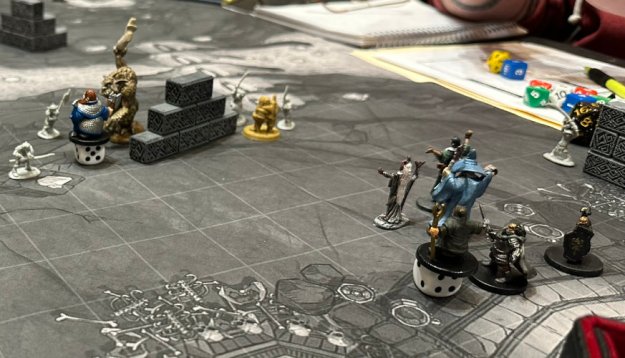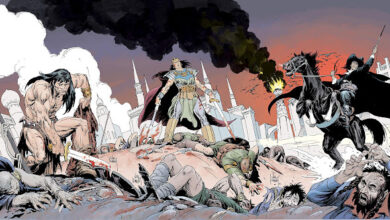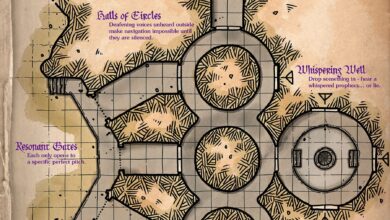5 Tropes that Make Exciting Stories But Ruin D&D Games

Stories like those in movies and books thrive on setbacks. Everyone relishes a tale where disaster complicates the heroes’ predicament, leaving them facing seemingly impossible odds. Perhaps a trusted ally betrays the heroes or they become trapped and imprisoned.
Gamers love when sessions deliver similar twists, so dungeon masters feel tempted to set up matching situations. What if the characters must use their wits to escape the dungeon? What if merchant who hired the party is the true villain? All dungeon masters set up similar situations at least once, and we all learn that some setbacks that make exciting fiction just make angry players. Here are five story tropes that game masters should never try to reproduce at the game table.
Here are five story tropes that game masters should never try to reproduce at the game table.
1. Taking the characters captive
In adventure fiction, heroes get captured regularly. So DMs dream up similar stories, and then try to force a capture despite the players’ determination to never get taken alive.
To engineer a capture, DMs need to hide an encounter’s threat to the players, block the characters’ attempts to flee, beat any signs of an unexpected rally, and so on. During all this, if the players see signs of the DM bending the odds to thwart their characters’ escape, they feel railroaded. DMs can’t plan for a capture.
D&D players will embrace threats that they understand and that choose to face. But if a dungeon master surprises the party with an unwinnable encounter, then the players will rightly see the situation as unfair and refuse to buy-in. Never surprise characters with threats they cannot either defeat or avoid.
Setting up the party for capture means setting up exactly the sort of encounter that players find unfair. (The same dynamic of using your power as a DM to ensure the players take a loss reappears through the rest of this list.)
Players will accept escape scenarios in two situations:
- With new characters at the start of a campaign. In this premise, the group starts as prisoners and escapes during their first adventures. Nobody feels like they played through an unfair loss. Instead, they just play a challenging opening hand.
- When the players rush into danger despite knowing that they face difficult odds, predictably get beaten in battle, and then their foes choose to capture rather than kill. Here, the capture gives the DM a chance to make the escape scenario into an alternative to a total-party kill.
2. Having someone the party trusted betray them
In fiction, a seemingly trusted ally who betrays the heroes makes a compelling third-act twist, the sort of complication that increases tension. But setting up a similar reversal in a D&D game hurts the game. In the typical setup, someone hires the party for a job that seems worthwhile, but in the end the group learns that they were duped by an evil patron. This can go two ways:
- If the players start by using Insight or a spell like detect thoughts to discover the patron’s sinister motives, then the adventure ends in a scene where the group decides whether to murder the guy.
- If the players assume the patron is trustworthy, then when they learn of their betrayal, they feel like dupes. Instead of enjoying the thrill of a twist, everyone just feels foolish.
Either way, the players learn to avoid future betrayals by refusing to trust anyone else they meet. This toxic dynamic makes the DM’s job harder because every potential ally seems untrustworthy and every adventure hook earns distrust.
Instead, tempt the heroes into accepting help from an ally who they know they can’t trust, but nonetheless offers something helpful.
3. Taking the characters’ gear
Players hate losing their characters’ gear. As a DM, have you ever tried to set up a perfectly reasonable situation like a social gathering or a diplomatic conference where in any plausible world the guests must surrender their weapons at the door? While the requirement makes perfect sense, in play, it leads to a fight or to frustrated characters turning away.
In D&D we call equipment treasure and reward success with it. Enough of a D&D character’s power and identity comes from their gear to make many players ready to sacrifice a character’s life before losing their equipment.
In D&D’s early days, some gamers coached DMs to deal with excess treasure by having thieves steal it as the characters slept. But despite spells like Leomund’s Secret Chest that seem designed to thwart thievery, no players enjoyed a D&D game that expected keeping a protective eye on gear. In fun games, the careful adventurers know how to keep their gear safe even if their players get careless.
In situations where the players should reasonably leave their gear behind, contrive ways for the party to smuggle it or otherwise keep it close at hand. Even if a party get taken captive according to the rules set by item 1, have their captors leave the equipment in a place the party can reach early in their escape.
4. Planning for a villain’s escape
Every DM loves a recurring villain. But to establish one, you need to introduce the villains and then somehow invalidate the players’ decision to murder them. D&D characters are so good at murder that escaping from a group of adventurers always proves nearly impossible without help from the dungeon master. And any such help will strike the players as a setup intended to deal an unfair loss to the party.
Instead, make your recurring villains into a group with multiple scoundrels. If one beats the odds and manages to escape an encounter with the party, promote him, but if he dies create another to take his place. When Stan Lee and Jack Kirby created Hydra in 1965, they turned the inevitable defeats suffered by comic book villains a threat. “Cut off one head, two more shall take its place.”
5. Having the players hunted
While filming for original Star Wars movie, Mark Hamill noticed their scene came right after the escape from the trash compactor. He said to Harrison Ford, “Shouldn’t my hair be all wet and matted?” Ford turned to him and said, “Hey, kid, it ain’t that kind of movie.”
In some roleplaying games, players expect to play cat and mouse with the heroes running scared, but D&D ain’t that kind of game. In D&D, running in fear feels like a loss. At best, an adventure where players must keep hiding and fleeing from an overwhelming threat feels like a frustrating string of losses. At worst, the characters make a hero’s stand and the adventure ends in a total-party kill. Either way, players feel like targets for the DM’s power trip.
The common thread
All these tropes share a common element: To create them at the table, the DM must contrive a way for the players to lose. To set up the twist, the characters must lose a fight or be tricked by an NPC.
Sometimes losses come naturally from play. For instance, players can lose because they made a bad choice or because they suffered a string of bad rolls. But when DMs use their power to arrange a loss, players will see the manipulation as unfair.
Players of some roleplaying games expect to lose. In Paranoia, the fun and humor comes from betrayal and a computer that does every character dirty. In Call of Cthulhu, the fun comes from a heroic struggle against insurmountable odds and an uncaring universe.
D&D ain’t that kind of game. D&D players relish overcoming obstacles and winning as a team. That doesn’t mean that DMs should set up players to win against paper tigers. Players want to feel like they overcame difficult obstacles using their own ingenuity and the power their characters’ bring. Notching a win that the DM arranged just feels empty.
So you can still include monsters that the party (probably) can’t beat just as your dungeon can include walls that the party (probably) can’t get past. The challenge becomes finding a different way past the obstacle, and that provides players the same pleasure as scoring a win in combat.
Related: The 4 Unwritten Rules No Dungeon Master Should Break
5 Situations That Tempt Every Dungeon Master to Railroad Their Players



